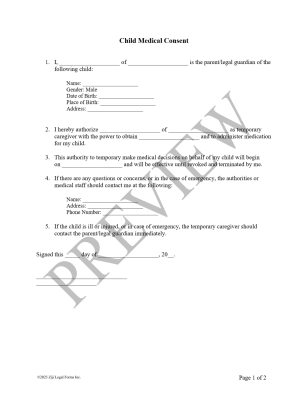Free Child Medical Consent
A child medical consent provides a temporary caregiver authority to seek healthcare and make medical decisions on behalf of a minor when you are unable to personally give consent for your child.
It is a legal document that allows a person with temporary rights to seek medical services and have the legal right to decide medical treatment for a child. It is generally used when a child is in the care of relatives, teachers/coaches, or other temporary guardians so the child will be given necessary medical care promptly in the case of emergency.
Click Create Document and let us get you started with your child medical consent. Just answer a few simple questions, revise as many times as you want and download your free PDF within minutes.

STEPS
